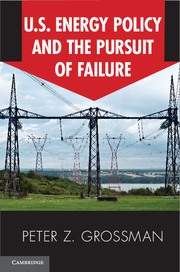4 - EIA
Published online by Cambridge University Press: 05 March 2013
Summary
A friend of mine worked in the Ford administration on energy policy. When he started, he and his group were told that they needed to come up with a plan to make the U.S. energy independent in ten years. After studying the problem for a while, they decided that their first job would be to redefine “independent.” Their second job would be to redefine “ten years.”
– Party anecdoteIntroduction
Gerald Ford was sworn into office in August 1974, the first person to take office after a president's resignation, and the first president never to have run for either the presidency or the vice presidency. In the ensuing months, Ford had to grapple with a number of issues of vital interest to the American people. Energy was one of them, and it was no longer foremost; according to a Gallup Poll in July, inflation was again overwhelmingly the number one concern. When Ford addressed Congress shortly after taking office, energy rated only a brief mention.
Of course, people had not forgotten the crisis of the previous winter but there was plenty of oil available – so much so, it was reported in September 1974, that in some cities, there were competitive gasoline “price wars.” Several major producers announced retail price cuts. Although there were worries about natural gas and propane shortages for the coming winter, the immediacy of a crisis had passed.
- Type
- Chapter
- Information
- US Energy Policy and the Pursuit of Failure , pp. 125 - 166Publisher: Cambridge University PressPrint publication year: 2013

